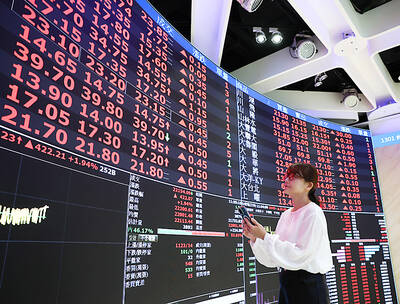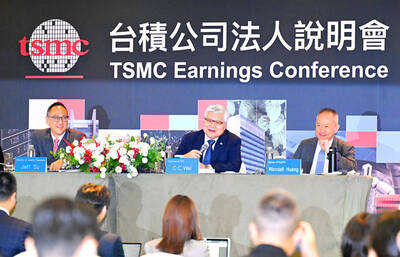Chinese automakers have bought assets from the UK to Australia as they seek to challenge General Motors Corp and Toyota Motor Corp in the global market. Their next stop may be closer to home.
Taiwan’s biggest partsmaker, Tong Yang Industry Co (東陽實業) and TYC Brother Industrial Co (堤維西交通工業), ranked second, both said this week they were open to deals that may help boost sales in China, Asia’s biggest auto market. China’s push to develop more advanced cars and warming cross-strait ties may make that possible.
“It is a good idea to take over partsmakers in Taiwan,” said Yale Zhang (張豫), a consultant at CSM Asia in Shanghai. “Component-makers there have come up with outstanding technologies in many areas.”
Tong Yang and TYC Brother have both more than doubled in Taipei trading this year on speculation Chinese carmakers’ existing ties with Taiwanese suppliers may lead to direct investments. The nation’s auto industry will likely be one of the first opened to Chinese companies. SAIC Motor Corp (上汽集團), China’s biggest domestic automaker, and Geely Holding Group Co (吉利控股集團) have both previously bought assets overseas.
China wants “to buy industry leaders — the biggest and the best,” said Peter Tzeng (曾耀德), a Taipei-based Polaris Securities Co (寶來證券) analyst.
Tong Yang, the world’s biggest maker of replacement fenders, would consider approaches from Chinese investors, company spokeswoman Fancy Hsu (�?�) said. None has been received so far, she added. The company, which built its first Chinese factory in 1994, supplies automakers including Chery Automobile Co (奇瑞汽車), China’s biggest own-brand carmaker, and China FAW Group Corp (第一汽車集團).
TYC Brother would “welcome proposals from Chinese carmakers to buy a stake if the tie-up will help us expand in China and globally,” spokesman Hsia Kang (夏康) said.
Depo Auto Parts Industrial Co (帝寶工業), Taiwan’s No. 3 partsmaker by sales, would consider deals if any were offered, spokesman Cheng Anshun (鄭安順) said.
Tong Yang, which also makes body-parts and windshields, climbed 5.9 percent in Taipei trading to close at NT$34, its highest since Oct. 15, 2007. TYC Brother rose 2.3 percent to NT$22.55. Tong Yang is the second-best performer this year among the 45 companies in Bloomberg’s global partsmaker index.
Chinese carmakers can consider deals in Taiwan as the Chinese government announced the end of an investment ban on April 29. The same day, China Mobile Ltd (中國移動) said it had agreed to buy 12 percent of Far EasTone Telecommunications Co (遠傳), the first investment by a Chinese state-owned company in Taiwan since a civil war ended six decades ago.
Taiwan’s Cabinet is set to consider opening up 65 industries, including autos, to Chinese investors within two months, Fan Liang-tung (范良棟), executive secretary of the Ministry of Economic Affairs’ Investment Commission, said on Wednesday.
Chinese automakers are already building a presence in Taiwan, with Chery and Geely, the largest private automaker, both set to begin sales this year. An automakers’ group also sent an 83-member delegation to Taiwan last month to look at options, including cooperation in developing in-car navigation systems.
“We see a lot of opportunities for development in Taiwan,” said Jin Yibo (金弋波), a spokesman for Wuhu, China-based Chery. The automaker, which will offer A3 compacts in Taiwan from November, will source 60 percent of parts locally, he added.
Chinese automakers are interested in investing in overseas partsmakers as a lack of technology is hindering government plans to develop global players. At present, most of the carmakers are predominately assemblers for overseas automakers.
“What we need most is the core technologies, such as the capacity to design and make engines and gearboxes,” said Zeng Qinghong (曾慶洪), general manager of Guangzhou Automobile Group Co (廣州汽車工業集團), a Chinese partner of Toyota and Honda Motor Co.
The company will consider acquisitions at home and overseas, he added.
“Whether Chinese companies have the management skills needed for overseas investments is the question,” said Zhang Xin, a Guotai Junan Securities Co (國泰君安證券) analyst in Beijing. The small size of the partsmakers — Tong Yang has a market value of about US$440 million — may also limit the benefits of deals, he added.

UNCERTAINTIES: Exports surged 34.1% and private investment grew 7.03% to outpace expectations in the first half, although US tariffs could stall momentum The Chung-Hua Institution for Economic Research (CIER, 中華經濟研究院) yesterday raised its GDP growth forecast to 3.05 percent this year on a robust first-half performance, but warned that US tariff threats and external uncertainty could stall momentum in the second half of the year. “The first half proved exceptionally strong, allowing room for optimism,” CIER president Lien Hsien-ming (連賢明) said. “But the growth momentum may slow moving forward due to US tariffs.” The tariff threat poses definite downside risks, although the scale of the impact remains unclear given the unpredictability of US President Donald Trump’s policies, Lien said. Despite the headwinds, Taiwan is likely

READY TO BUY: Shortly after Nvidia announced the approval, Chinese firms scrambled to order the H20 GPUs, which the company must send to the US government for approval Nvidia Corp chief executive officer Jensen Huang (黃仁勳) late on Monday said the technology giant has won approval from US President Donald Trump’s administration to sell its advanced H20 graphics processing units (GPUs) used to develop artificial intelligence (AI) to China. The news came in a company blog post late on Monday and Huang also spoke about the coup on China’s state-run China Global Television Network in remarks shown on X. “The US government has assured Nvidia that licenses will be granted, and Nvidia hopes to start deliveries soon,” the post said. “Today, I’m announcing that the US government has approved for us

The National Stabilization Fund (NSF, 國安基金) is to continue supporting local shares, as uncertainties in international politics and the economy could affect Taiwanese industries’ global deployment and corporate profits, as well as affect stock movement and investor confidence, the Ministry of Finance said in a statement yesterday. The NT$500 billion (US$17.1 billion) fund would remain active in the stock market as the US’ tariff measures have not yet been fully finalized, which would drive international capital flows and global supply chain restructuring, the ministry said after the a meeting of the fund’s steering committee. Along with ongoing geopolitical risks and an unfavorable

DEMAND: The forecast did not factor in potential increases from lifted US restrictions on Nvidia’s H20 chips to China, which TSMC CEO C.C. Wei described as ‘good news’ Taiwan Semiconductor Manufacturing Co (TSMC, 台積電), a major chip supplier to Nvidia Corp, yesterday raised its revenue growth forecast for this year to 30 percent in US dollar terms, thanks to exceptionally strong demand for artificial intelligence (AI) and high-performance computing (HPC) applications. The new revenue growth forecast surpasses the 25 percent expansion estimated by TSMC three months ago and beat almost all industry analysts’ expectations. Booming AI demand helped propel the chipmaker’s net profit by 60.7 percent last quarter to a record high of NT$398.27 billion (US$13.54 billion), from NT$247.85 billion a year earlier. That represented a sequential increase of 10.2